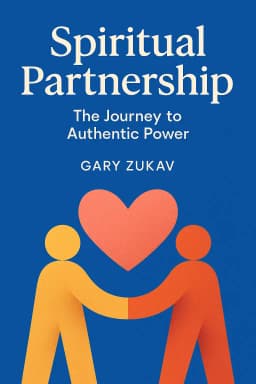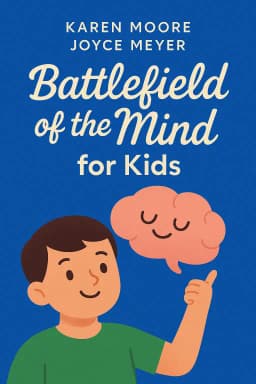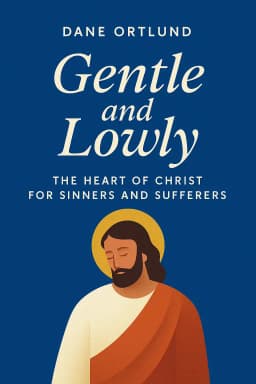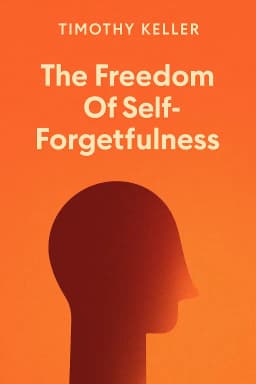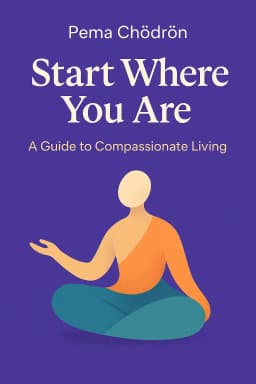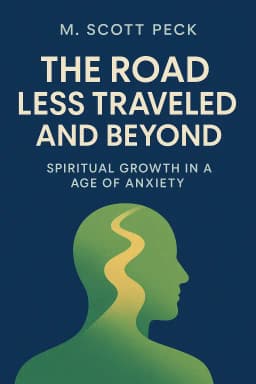
The Shortcut to Suffering
Spiritual Growth in an Age of Anxiety
Golden Hook & Introduction
SECTION
Daniel: Most self-help tells you to find happiness. What if the real goal of personal growth isn't happiness at all, but something much harder and more powerful? What if the point is to become more competent at suffering? Sophia: Whoa, okay. That's a pretty intense way to start. It’s definitely not the 'live, laugh, love' poster I had on my wall in college. But honestly, it sounds more realistic. Life is hard. The idea of just getting better at dealing with it feels more useful than chasing some fleeting feeling of joy. Daniel: That tough-love approach is exactly what we're diving into today with M. Scott Peck's final book, The Road Less Traveled and Beyond: Spiritual Growth in an Age of Anxiety. Sophia: Right, and Peck was a psychiatrist, not just a spiritual guru. What's wild is that his own life was famously complicated—he openly discussed his struggles with depression and addiction. He wasn't preaching from a pedestal; he was writing from the trenches of his own difficult journey. Daniel: Exactly. And that's what makes his first big idea so powerful. He argues that our biggest problem isn't our circumstances, but our addiction to what he calls 'simplism'—our desperate need for easy answers.
The Crusade Against Simplism
SECTION
Sophia: Simplism. I like that word. It sounds like a disease, which I guess is his point. It's the mental equivalent of only eating junk food because cooking a real meal is too much work. Daniel: That’s a perfect analogy. And he has this incredible story from his psychiatric practice that shows just how deep this "disease" can run. He had a patient, let's call him John, who drove a long way from a country town for therapy twice a week. John constantly complained about the drive—the time, the gas money, all of it. Sophia: Okay, relatable. My commute is my daily villain. Daniel: So Peck, trying to be helpful, draws him a map of a shortcut. A significantly shorter, faster route. He hands it to John and says, "Here, this will save you time and money." Sophia: Problem solved, right? Daniel: You'd think. But the next session, John complains about the long drive again. Peck asks, "Did you try the shortcut?" And John says, "Oh, I... I lost the map." So Peck, patient man, draws him another one. This goes on, not for weeks, but for two years. John keeps complaining, keeps "losing" the map, and keeps taking the long way. Sophia: Hold on. Two years? Of taking the long, expensive route when a shortcut is right there? That’s not just lazy, that's... pathologically stubborn. What was his deal? Daniel: That's the million-dollar question. Peck eventually got so frustrated he conducted an experiment. He drove both routes with John, stopwatch and all, and proved he'd wasted hundreds of hours and thousands of dollars. It wasn't until the third year of therapy that John finally confessed his dominant motive in life: to avoid any and all change. The shortcut, as simple as it was, represented a change. The long, painful road was familiar. He preferred the certainty of his complaint to the uncertainty of a new path. Sophia: Wow. That story is so much more than just a guy who can't follow a map. It's about the deep, irrational fear of the unknown. It’s easier to suffer in a way we understand than to risk a new kind of comfort. We see this everywhere, don't we? People staying in bad jobs or bad relationships because leaving is too scary. Daniel: Precisely. Peck calls this simplistic thinking. It’s the refusal to engage with complexity. He saw it on a societal level too. He tells another story about a wealthy stockbroker after the L.A. riots. The stockbroker just shrugged and said the cause was simple: "a decline in family values." Sophia: The ultimate hot take. One simple cause for an incredibly complex event. Daniel: And Peck just dismantled it. He explained the concept of "overdetermination"—that anything important has multiple, tangled causes. The legacy of slavery, economic recession, prejudice, police brutality... it's a whole web of factors. But the stockbroker, like John with his map, preferred the simple, comfortable explanation that required no deep thought and, conveniently, no responsibility from him. Sophia: Because if the problem is that complex, maybe you're part of it. If it's just "family values," you can sit back and judge. That's the danger of simplism—it absolves us of the hard work of thinking. Daniel: And that is the first major battle on the road less traveled. You have to actively fight your own brain's desire for the easy answer.
Consciousness as Competence and Power
SECTION
Sophia: Okay, so if we manage to fight off this addiction to simplicity, what's the goal? You said at the top it's not happiness. What is it? Daniel: In a word: consciousness. But Peck has a very specific, and I think radical, definition of it. He says the purpose of increasing your consciousness is to increase your competence. And he has this amazing line he'd tell his patients: "Psychotherapy is not about happiness; it is about power." Sophia: That sounds a little... Machiavellian. Is he talking about power over other people? Daniel: Not at all. It's power over yourself and your own life. It’s the ability to effectively handle the problems that life throws at you. He tells the story of a nurse named Heather. At the nursing home where she worked, she was a superstar. Conscientious, skilled, beloved by everyone. In her professional life, she was the definition of competence. Sophia: I can picture her. The person you want in charge when things go wrong. Daniel: Exactly. But in her personal life, she was a complete mess. She consistently chose abusive or unavailable partners. Her judgment was terrible. She was highly competent in one system—her job—but completely incompetent in another—her relationships. Her therapy wasn't about making her "feel better" about her bad choices. It was about raising her consciousness so she could understand why she made them, and thereby gain the competence, the power, to choose differently. Sophia: I love that distinction. It's not about feeling good, it's about getting good at living. So what does 'increasing consciousness' actually look like in Peck's view? It sounds a bit abstract. Daniel: He grounds it in biology and psychology. He talks about our frontal lobes, the part of the brain responsible for judgment and planning, as the seat of consciousness. To be conscious is to be aware of your own thoughts and feelings, to be able to observe them without being controlled by them. He calls the pinnacle of this the "transcendent ego." Sophia: Okay, 'transcendent ego' sounds like something you'd buy at a crystal shop. Break that down for me. Daniel: (laughs) Fair enough. It's the ability to orchestrate your own emotions, rather than be a slave to them. He gives this fantastic example of a university president during a time of student riots. The faculty was in an uproar, meetings were chaos. This new president would just sit there, listening calmly. But in one huge meeting, a young, arrogant professor stood up and insulted the entire administration. Sophia: And the president lost it? Daniel: No. He unleashed it. With total control. He didn't scream, but his voice became steel. He calmly, precisely, and devastatingly took the professor apart. It wasn't an emotional outburst; it was a calculated deployment of anger to restore order. The person observing this said it was one of the most impressive things he'd ever seen. That's a transcendent ego. The president was aware of his anger, he chose to use it, and he used it effectively. That's the power Peck is talking about. Sophia: Wow. So consciousness isn't some passive, meditative state. It's an active, powerful tool for navigating the world. It’s the difference between being the weather and being the meteorologist. Daniel: That’s a brilliant way to put it. You're not just in the storm; you understand it, and you can navigate through it.
The Other Side of Complexity
SECTION
Daniel: But here's the great paradox Peck builds towards. After all this work to build up your thinking, your consciousness, your power... the final step is to give it all away. Sophia: Give it away? After all that effort? That sounds like a terrible return on investment. What does that even mean? Daniel: It means you reach the limits of your own power and have to surrender to something greater. This is the simplicity on the other side of complexity. It’s not the ignorant simplicity of the stockbroker; it’s a hard-won, wise simplicity. He uses the theological term 'kenosis,' which literally means 'self-emptying.' Sophia: Kenosis. Okay, another one for the glossary. So you build yourself up just to empty yourself out? Daniel: Precisely. You have to have a self before you can give it up. Peck illustrates this with one of his own dreams. He was at a point in his life where his first book was becoming a massive, unexpected success, and he was terrified. He didn't know how to handle the fame and publicity. So he went on a retreat, praying for guidance. Sophia: And did he get an answer? Daniel: He got a dream. In the dream, he was a seventeen-year-old boy, and his father was driving him around in a car. But the father was autocratic, controlling everything, not letting the boy touch the wheel, and even making him pay for the gas. In the dream, Peck was furious at this controlling father. But when he woke up, he had a stunning realization. Sophia: That the father was God? Daniel: Yes. And the message wasn't that God was a tyrant. The message was, "Hey, Scotty, you just pay your dues and leave the driving to me." It was a call to surrender control. To trust that a higher power had the wheel, even if he didn't like the way it felt. He had spent his life learning to drive, becoming competent, and now the ultimate lesson was to let go and be a passenger. Sophia: Ah, I see it now. The simplicity on this side of complexity is John refusing to even look at the map. It's lazy and ignorant. The simplicity on the other side is having studied the map, driven the roads, become an expert navigator, and then having the wisdom to hand the keys to someone you trust more. It's not giving up; it's letting go. Daniel: You've got it. That's the whole journey. And this is where, for Peck, science and spirituality finally merge. The "science" is the hard work of psychology, of building consciousness. The "poetry" is the faith required for that final act of surrender.
Synthesis & Takeaways
SECTION
Daniel: So the entire arc of the book is this profound three-step journey. First, the courageous battle against our own mental laziness—the crusade against simplism. Second, the disciplined work of building consciousness to gain real competence and power in our lives. And finally, the ultimate paradox: the wisdom to surrender that hard-won control to find a deeper, more meaningful simplicity. Sophia: It really reframes the whole idea of personal growth. It’s not a straight line to happiness. It’s a rugged, circular path. And it’s guided by that incredible quote from Justice Oliver Wendell Holmes, Jr. that Peck loved so much. Daniel: Say it. It’s the perfect summary. Sophia: "I don't give a fig for the simplicity of this side of complexity, but I would die for the simplicity on the other side." It just gives me chills. It’s a call to do the work, to wrestle with the messiness of life, not to find an easy answer, but to earn a state of grace. Daniel: And that leads to a final, reflective question for everyone listening. Sophia: I think I know what it is. It makes you wonder, where in your own life are you sticking to the long, familiar road, just to avoid the discomfort of taking a shortcut? What's one small, complex truth you've been avoiding for a simple lie? Daniel: That’s the question. We'd love to hear your answers. Join the conversation online and let us know what resonated. It’s a tough path, but as Peck shows us, it’s the only one that leads somewhere worthwhile. Sophia: This is Aibrary, signing off.
